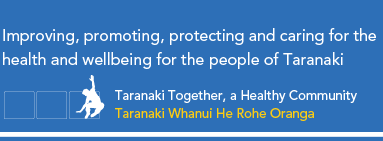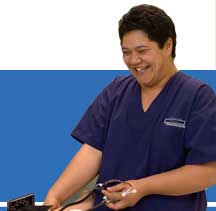Below is an open letter to Hawera Hospital staff from Chief Executive Tony Foulkes about Hawera Hospital and South Taranaki Services
6 July 2010
I respect the emotion and understand the fear of change that has been reflected in the various media stories about health services recently.
At the outset I’d like to acknowledge the wonderful job staff in Hawera Hospital, and indeed the whole Taranaki health sector always endeavour to do.
I would like however the opportunity to comment on the challenges we’re facing as a community, and in particular the context of South Taranaki.
The reality is that medicine and health in general is changing all the time, not just locally, but throughout New Zealand and all around the world. In Taranaki, we need to keep up with that wherever possible. Compared to only even five or 10 years ago the possibilities are greater, demand is greater and expectations are greater.
In health, no matter how much we have, we can always find a good use for more money – and that’s the same globally.
The DHB’s job though is to work with people to get the best we can for all the people of Taranaki with the resources we’ve got. That includes for example the skilled clinicians, support staff, carers, facilities, equipment and technology, in hospitals and the community.
In doing that job my biggest fear is the status quo.
First of all because whilst everyone works to do a very good job, I think we can do even better with and for Taranaki people; and secondly because we can’t afford the status quo.
This sounds like an impossible conundrum of doing the same or more, with better outcomes, for less cost – however I believe it is achievable.
It’s widely accepted by clinicians and others involved that we need to change the way we provide services, and how services relate to one another caring for the same patients. Some of those changes may mean challenging ourselves about who does what, where, and when. They may be through the greater use of technology to help clinicians, patients and their carers, to have the information they need when they most need it, and for it not to be duplicated in different places. This could mean more timely, and potentially better care or treatment.
I’ve got some views on what that may mean in practice, and I know other people will have. We’ve got to be able to have the discussion and debate, in a way that people can be open to genuinely listening to one another. If we assume what we’ve got now is the best it can be, and get into fight mode to defend it, then we’ll be doing ourselves and our fellow community members a disservice.
I’ve canvassed the thoughts of a number of senior doctors and other clinicians, and their views of how things could or should be for the future. I’ve asked if in making changes to how we use our resources could people still be cared for safely and appropriately. The answer is not only yes, but potentially better than now.
I’m very conscious that not everyone would necessarily agree, and therefore we need to create more opportunities for discussion and debate on such questions, for example between hospital and primary care clinicians, with community members and groups.
Of course there are important details about how things work in practice, but the recent changes to staffing the ward and ED in Hawera are about making better use of the resources, skills, and facilities available, to provide the services to our patients. Something that when looked at objectively is acknowledged by most people as making sense.
Even after these changes, what might the challenges mean in practice for Hawera and South Taranaki in the future? Well for example I think we have to look at the approximately 16,000 patient attendances a year at Hawera ED, and ask if they are getting their health needs met in the best way. Whilst everyone should be getting their immediate issues dealt with, there are about 12,000 of those attendances that would probably be better served overall by being seen and followed up by a service working closer with their GPs.
We know the permanent and locum staff in General Practice do a grand job, but they struggle with the demand. We hear that people have to wait too long for an appointment or they prefer the ‘free’ ED service.
Whatever the reasons, and whatever have been the barriers to addressing them, these are the kind of issues we have to discuss and sort out properly, so that together we can do better for the people of South Taranaki.
Hawera Hospital is not a mini-version of Base Hospital, nor is it ever likely to be, even with permanent and no locum staff.
The people of South Taranaki like all Taranaki people deserve access to the full specialist teams with back up support and technology if that is what their clinical condition requires. These are mainly in New Plymouth, and so when people need to be in hospital, we need to ensure that people can access those services as soon as possible; We need to ensure things are coordinated well, and tests or treatment happens as soon as practical, and that people can return home from hospital as soon as appropriate.
If people need some extra help at home then this should be well coordinated too. However if even with such help it’s not appropriate for them to be at home, and they need some hospital level nursing care or rehab in another bed, even if they don’t need the full high tech specialist hospital, then they should also have access to that.
We currently don’t do as well as we could in using the various skills in the best place for the patients, or in coordinating all the various aspects of care. These are also the kinds of things we need to discuss further and sort out properly, so that together we can do better for the people of South Taranaki.
Hawera Hospital is a great facility, and we need to continue to make the best use of it along with other facilities to help meet the current and future needs of the community. As services change into the future, exactly what services should be provided from that facility and how they relate to all the other services caring for the same patients and community, is what we have to engage on and talk about.
If things were proposed to change and that created new or increased challenges for people accessing services, then they’re also the things we’d have to identify, discuss and sort out.
I want us to be able to do that in a constructive way, where as I said before, we genuinely listen to one another, and take on board the advice of our hospital and community clinicians, so that we can actually solve that seemingly impossible conundrum.
I recognise that we need to particularly engage with the community in South Taranaki. I want us to be able to arrange for this together with the Primary Health Organisations, other health service providers and of course staff employed at the Hospital.
I’ve already discussed this with community leaders including Ross Dunlop, Neil Walker and members of the Hawera Hospital Community Committee. They agreed I’d meet with them again in late July, and then we’d have a whole series of discussions involving clinicians, service providers and various community groups. That’s what I think is appropriate, and what the DHB wants and intends to do.
I also know such a process is what the Board and Minister of Health would want to happen.
I’m looking forward to the DHB being able to engage in this way. In the meantime thank you for your contribution and ongoing commitment to the services you provide for our community.
Last updated: Tuesday, July 6, 2010



